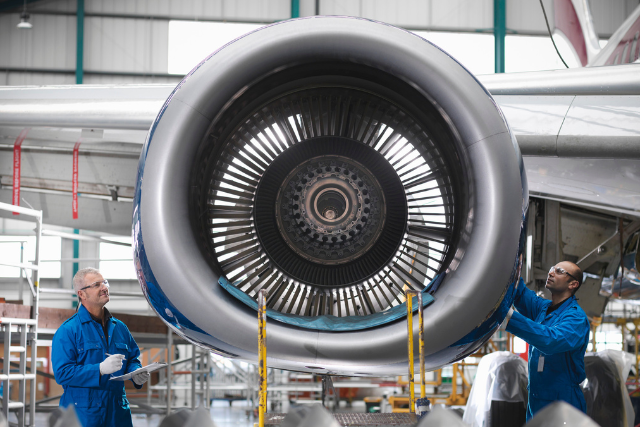How Much Money Does a Welder Make Per Hour?
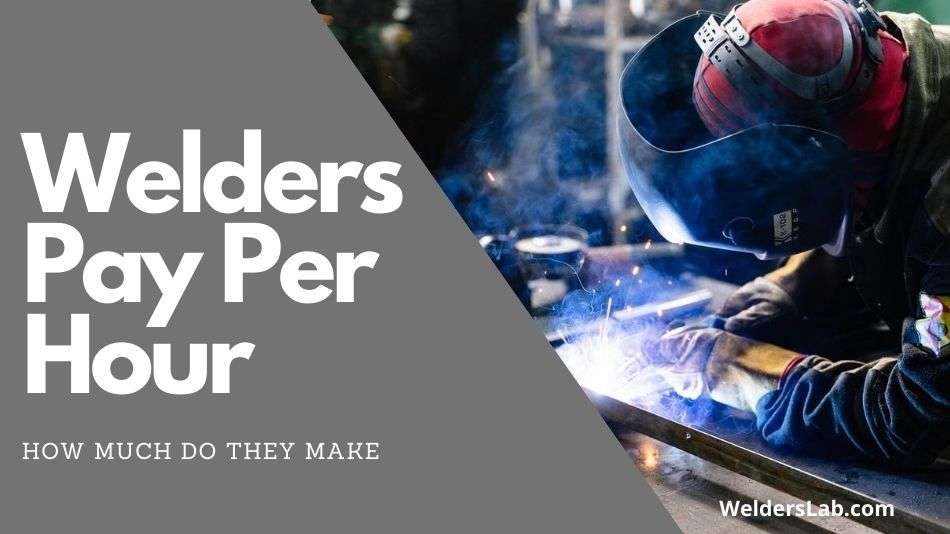
There are a lot of factors to consider when you’re planning to pursue a welding career. One important factor is the dollar signs involved in such a career. We all have to make a living and sometimes part of the selection process boils down to whether or not you will be able to make enough to pay the bills.
How much money does a welder make per hour? On average, a welder will make anywhere between $13.60 and $26.24 an hour (based onPayscale.com). The median pay a welder will earn is $18.22. However, all of this depends on the industry your welding in, and the skills that you have.
In this guide, I will be breaking down the topic of how much money does a welder make per hour. We will cover various factors that could influence your hourly pay and break it down into various welding jobs as well. We’ve got a lot of great information to share here.
How Much Money Does a Welder Make Per Hour? A Complete Guide
Answering questions like “do welders make good money?’ is a challenge because the numbers vary a LOT. Yes, I can give you median salaries and hourly wages based on statistical information all day long. But here’s what you really need to know.
How much money a welder makes in a year, a month, a week, or an hour could be affected by multiple factors. I’m talking, location, skills, experience, certification, industry, and several other factors. In order to give you the best idea, I feel like we break it down so you get a clear picture from many different outlooks.
Telling you my hourly wage would be fruitless. I’ve had years to build my career and skills and there’s no guarantee you will make what I make. On the flip side, you could potentially make more than me in some industries and positions.
What is the Average Pay for a Welder?
Let’s start by discussing the average pay for a welder broken down by job types and industries. This information will be solely based on national averages, not taking into consideration location, skills, or training.
Remember that there are a lot of welding industries. Here are a few of the top ones.
- Industrial pipeline welders
- Underwater welders
- Nuclear industry welders
- Aerospace welders
- Military support welders
- Construction welders
- Maintenance welders
- Manufacturing welders
There are far more options than these but we could be here all day perusing different welding jobs and still probably never finish. For the sake of not making you read all day long, I’ve selected just a few to cover. This is a decent spread of various industries to give you an idea.
I’ve selected some of the highest paying industries and some other common industries as well.
Industrial Pipeline Welders
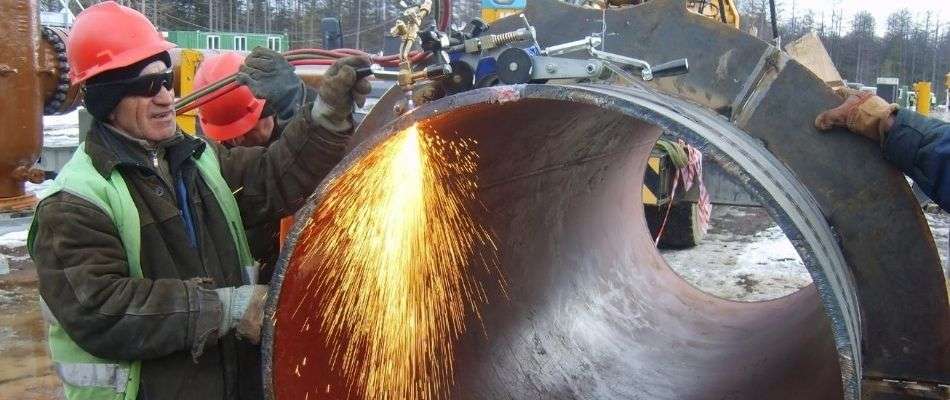
Pipeline welding is one of the highest-paying welding industries out there. In this welding industry, you have the potential to make 6 figures. Of course, there are pipeline welders that make far less. The annual salary range for pipeline welders is anywhere from $36,414 to $106,348. That’s quite a gap.
An industrial pipeline welder obviously works on pipelines. This could mean moving around or traveling for work. You also will most likely be working a lot of hours. You never really know where you might end up or the environment or weather you might be welding in.
This industry takes skill and determination, which is perhaps why it is one of the higher-paying welding industries. The average annual salary of a pipeline welder is $69,841. The average hourly wage of a pipeline welder is about $34 an hour.
Depending on your lifestyle and the conditions you’re willing to work in, pipeline welding is a high-paying line of work and you have the potential for bonuses as well. Pipeline welding is considered to be in the top 6 for welding pay industries.
Underwater Welders

Underwater welding, doesn’t that sound fascinating? This industry actually has the highest pay rate for welding industries if you’re near the top of the pay scale. Underwater welding can range anywhere from $54,750 – $300,000 for an annual salary. Even the starting wage is much higher than the average.
Here’s the thing, while this sounds exciting there aren’t a ton of jobs available in this field. It’s fairly limited and challenging to get into. It requires extremely high skill levels and it’s also a very dangerous job. You’re working with an electrical current in the water. There is a reason this job pays so high.
Underwater welding requires skills in welding as well as scuba experience. This is an expert-only welding industry so don’t plan to start out here but it gives you something to work for if it catches your interest.
While you can potentially make a lot of money here, the average underwater welder hourly pay is $25.96. The reason the annual salary can jump so high is that underwater welders are typically paid per job and can put in a lot of hours. It’s the overtime and the time away from home that drives the pay so high.
Nuclear Industry Welders
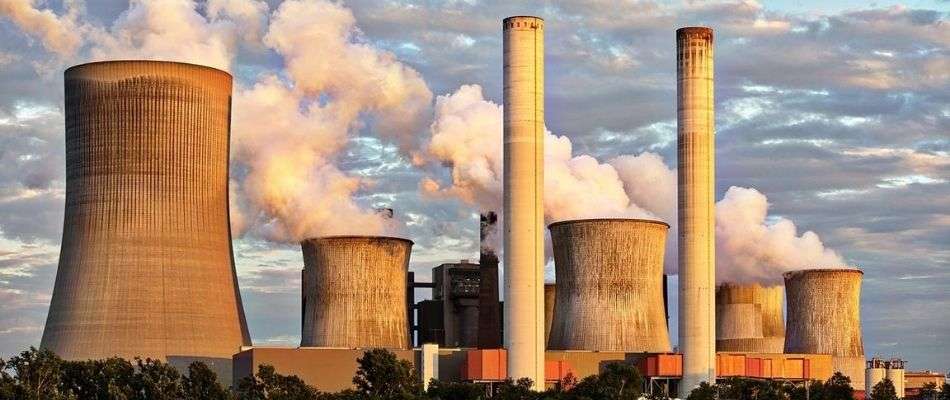
I’m throwing this one in here because it’s a fascinating industry. Welders who work with the nuclear industry can find themselves in many fields, including pipeline, underwater, and more. The difference is to become a nuclear welder you must have a special certification for handling the material.
The average hourly wage for a nuclear industry welder is $32 per hour with an average annual salary of about $66,978.
Aerospace Welders

Aerospace welders can work with airplanes or with space shuttles. There’s a pretty broad range in aerospace as far as pay is concerned. Most aerospace welding careers do require certification but it’s not as extensive as say nuclear welding certification.
You can often start in aerospace welding shortly out of high school and start at a decent wage. Aerospace welding is one of the higher-paying welding industries that is not challenging to get into or demanding as far as extensive travel and awful working environments go.
Aerospace welders average about $30 an hour, with the range typically falling between $26 and $34 per hour. This is one of the more reliable fields with a steady higher pay scale. While certification may be required, they will often hire you without it and put you through a certification program. Of course, this varies as well.
This is an ever-changing field so be willing to learn new things and adapt to changes as they come.
Military Support Welders

Military support welders can make up to $160,000 per year. There is an overwhelming demand for military support welders. It’s always possible that you will be in a combat area, making this a risky career.
There are many options for military support welders, in all branches of the military. The average hourly wage for military support welders is about $25 an hour. This primarily depends on where you’re welding and the type of welding you’re doing. There is certainly the potential to earn far more.
Construction Welders

Now we’re getting somewhere. This is one of the more common welding positions out there. In the construction industry, there are several welding jobs as well. You might be a metal worker, a structural welder, or something else.
If you’re working in construction, the average salary is $24.43 per hour. It’s hard work and you may be working outdoors in all kinds of weather environments. You also may get a lot of hours when you have big projects.
Maintenance Welders
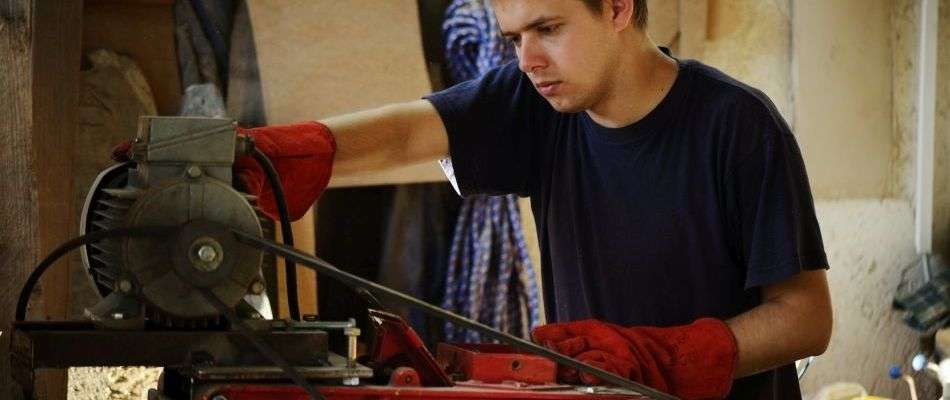
Maintenance welders again vary greatly. You can be a maintenance welder in a lot of different environments and industries. You could work for the railroad or you could work as a mechanic/maintenance person in a factory setting.
Maintenance welders are another high demand category. It’s easy to find maintenance welding positions most of the time. Maintenance welders sometimes can make far lower, especially if you’re new to the field.
However, the average maintenance welder salary is around $25 an hour.
Manufacturing Welders
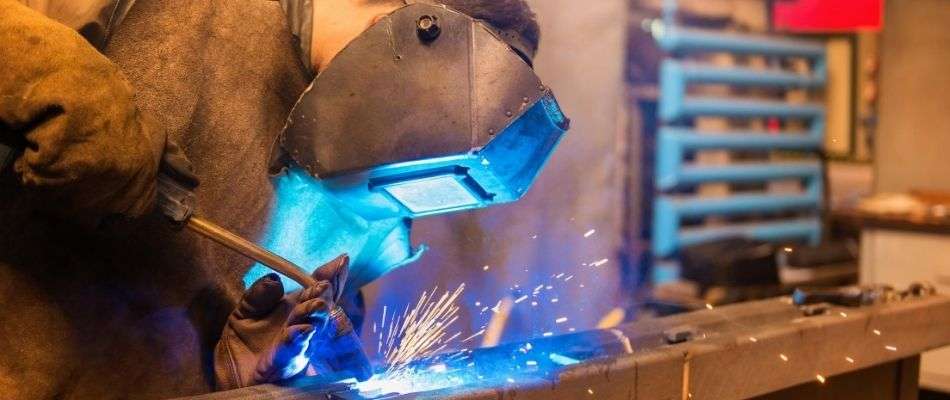
Manufacturing welders can also have a lot of different duties. This is a good industry for those getting started as well. Production welding falls into this category as well. Manufacturing welding typically has to do with fusing metals together in different ways and environments.
You may or may not need a certification for manufacturing welding. Many of these jobs can be taken without a certificate. This is one of the lower-paying fields, which is understandable since it doesn’t require intense skill or certification.
The average hourly pay is around $16.21 for this type of welding. You can build your skills and earn more with experience.
What Factors Determine How Much a Welder Will Make?
We mentioned earlier that there are multiple other factors that can affect how much you will make as a welder. The industry we know makes a significant difference based on the risks of the job and the type of work you will be doing.
Beyond that, here are a few of the main items that may affect your hourly pay as a welder.
- Location
- Type of Job
- Training and certifications
Location
Some states and specific locations pay much higher than others. Some of this is based on the cost of living and the demand in those areas.
For example, in Kansas, starting out with limited experience, the median salary is $39,236. This is the Midwest where cost of living tends to be slightly lower.
The same position in Jacksonville, Florida pays just slightly higher at $40,295. And if we take it to the other coast, the median salary with limited experience is about $50,318.
As you can see, the location can make the salary adjust significantly. These are base salaries that don’t include any bonuses and they are just based on an average for those areas. You can figure the hourly here by breaking it down.
For example, the Kansas salary provided would break down to an average hourly wage of $18.86 while the California example provided would break down to an average hourly wage of $24.19. This is of course based on a typical 40-hour work week for 52 weeks of the year.
Type of Job
We’ve talked a lot about the type of job and how drastic the ranges are already. Keep in mind there are a ton of welding jobs and they are available in multiple industries. The more experience and training you have, the better rate of pay you are likely to earn.
It does take time and hard work to build yourself up. It takes the willingness and effort to hone your skills and work towards your goals. There are plenty of welding jobs that don’t even require a certificate. It is these positions that are going to pay less across the board.
There’s always a starting point. As you increase your skills and knowledge and maybe even pursue certification, you can also increase your salary and your hourly wages.
Have a goal of where you want to be and work towards it.
Training and Certifications
This one is a given and it’s the same in almost every industry, not just welding. The more training you have, the more valuable you are. I totally understand that training doesn’t happen overnight. This is why the pay scale increases as you continue to train and earn certifications.
Some industries will not hire you without certifications and some industries require specific certification due to the nature of the job. You see this a lot in some of the higher-paying industries. In some industries, they require certification because of the risk associated with the job.
The fact of the matter is that the more you train, the more knowledge and skill you are likely to build. Yes, you can get a welding job right out of high school. Just remember that you are likely to start near the bottom of the scale.
What Can You Do to Earn More Per Hour as a Welder?
You can’t always expect to earn the big bugs fresh on the job. This is where you have the chance though to build. Also, if you really want to start out at a higher level, it might be worth your while to pursue basic certification or certification for the industry that you plan to pursue a career in.
The best tip I can give you to earn more is to continue to learn. Take an entry-level position if you need to but don’t stop there. In order to earn more per hour, there are 2 basic tips.
- Choose an industry that pays well
- Build your experience, knowledge base, and certification level
I’ve hit a lot on both of these aspects already and I don’t want to sound like a broken record. The industry, the location, and your skills will essentially determine your hourly wage.
Are you willing to relocate or travel? Are you willing to get specific certification or training? This is an ideal time to determine your goals and where you want to take your welding career. Remember that it’s ok to start with an entry-level position and then work your way up from there.
Conclusion
How much money does a welder make per hour? Well, ultimately the answer is, it depends. It depends on you, it depends on your efforts, it depends on availability. Don’t read these numbers and automatically decide you have to be an underwater welder because they make the most.
Remember that some of these welding jobs require extensive experience and underwater welding is one of them. The point I’m trying to make is that you have the potential to make a great living as a welder.
There is a common misconception that welders don’t make very much. It’s true that there are welding positions that don’t pay a lot and as an entry-level welder that may be where you start out. However, there are far more welding positions that pay well.
Ultimately, if you want to answer the question “do welders make good money?” you need to determine whether you’re willing to work, practice, learn, and put in the effort to advance yourself.






